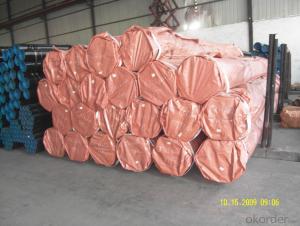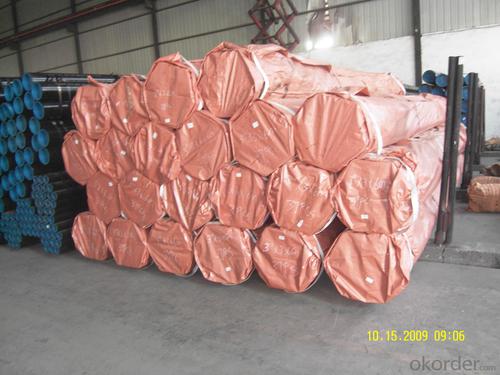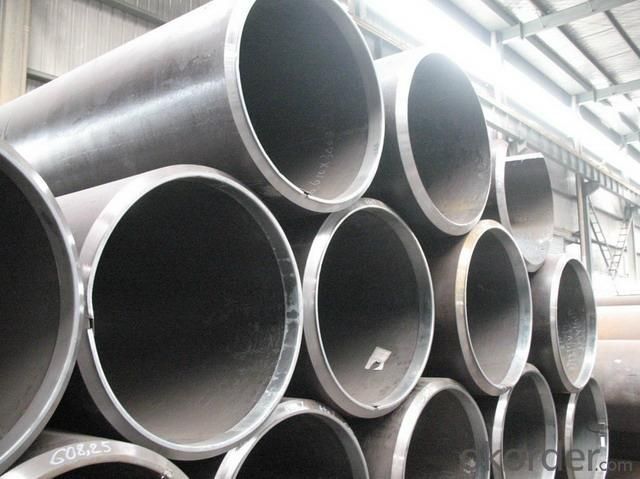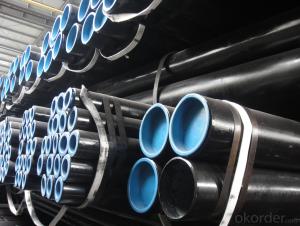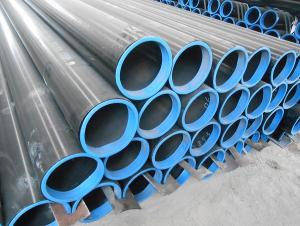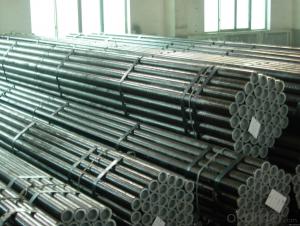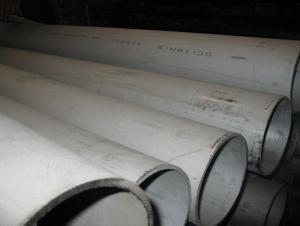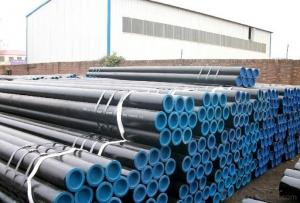Seamless Hot Rolled Steel Pipe > 114.3
- Loading Port:
- China Main Port
- Payment Terms:
- TT or LC
- Min Order Qty:
- 100 m.t.
- Supply Capability:
- -
OKorder Service Pledge
OKorder Financial Service
You Might Also Like
Specifications
1. OD 21MM-1066MM, WT 2MM-60MM
2. certificate: ISO, API
3. Strength: large diameter thick wall seamless pipe
4. BE, PE.
Carbon Steel Seamless Pipes | |
OD | 21.3mm-1066.8mm(1/2”-42”) |
WT | 2mm-60mm |
Length | Random Length: 3.5m-12m, or fixed length 5.8m or as the customer’s requirement. |
Standard | ASTM A53, ASTM A106, API 5L, DIN 17175, GOST8731/8732, G3457/G3452 etc. |
Material | Q235B, 10#,20#,45#, 16Mn, 15MnV. A53B, A106B, API5L B, A192, A179C, A213-T12, A213-T22, A335-P1, A335-P2, A333 ST37, ST33, ST37-2, ST35.8 ST42 etc. |
Certificate | API certificate and ISO certificate. |
Surface | Rust remove, black painting, antirust oil, varnish, 3PE, hot-dip galvanized etc. |
Package | By bundles, plastic caps or steel caps, woven, wooden cases or as requirement. |
Capability | 6000tons/month. |
End | BE/PE. |
Advantage | Big diameter and thick wall pipes. Best price with good quality. The partner you can trust. Good service and very patient. |
Seamless steel pipe | ||||
Alloy pipe | Cr5Mo(P5, STFA25, T5) 15CrMo(P11, P12, STFA22) 13CrMo44 12Cr1MoV P22 (10CrMo 910) T91, P91, P9, T9 Wb36 | GB5310-95 GB9948-88 ASTM335/A335M ASTM213/213M DIN17175-79 JISG3467-88 JISG3458-88 | 16-824*2-100 | The seamless steel pipe features resistance to high pressure, high/low temperature and corrosion and is used in the industries of petroleum, chemical engineering and electric power as well as boiler |
High-pressure boiler pipe | 20G, A106, ST45.8/ | GB5310-95 ASTMA106-99 DIN17175-79 | 14-630*2-80 | Temperature-resistant seamless steel pipe for high-pressure boiler |
High-pressure seamless pipe for petroleum cracking and fertilizer making equipments | 20, 12CrMo, 15CrMo | GB9948-88 | 10-530*1.5-36 | Boiler price for refinery, heat-exchanging pipe, seamless steel pipe for pipeline |
20, 16Mn, Q345 | GB6479-2000 | 18-530*3-40 | Fertilizer making equipment and pipe line | |
Low and medium pressure boiler pipes | 10, 20 | GB3087-1999 | 10-530*2-40 | Over-heat pipe for low and medium-pressure boiler, boiling water pipe, locomotive smoke pipe(big and small) |
Fluid pipe | 20, Q345 | GB/T8163-1999 | 8-630*1.0-40 | |
Structural pipe | 10,20,35,45, 16Mn, Q345B | GB/T8162-1999 | 6-1020*1.5-100 | |
Line pipe | Grade B | API | 60-630*1.5-40 | Carrying gas, water or oil in the industries of petroleum and natural gas |
Hydraulic prop pipe | 27SiMn | GB/T17396-1998 | 70-377*9-40 | |
Ship pipe | 410 | GB/T5312-1999 | 14-426*1.5-45 | Pipes for ship, boiler and over-heater |
FAQ of Seamless Pipe:
①How is the quality of your products?
Our products are manufactured strictly according to national and internaional standard, and we take a test on every pipe before delivered out. Guaranteed: If products’ quality don’t accord to discription as we give or the promise before you place order, we promise 100% refund.
②How about price?
Yes, we are factory and be able to give you lowest price below market one, and we have a policy that “ for saving time and absolutely honest business attitude, we quote as lowest as possible for any customer, and discount can be given according to quantity.
③Why should you chose us?
Chose happens because of quality, then price, We can give you both.Additionally, we can also offer professional products inquiry, products knowledge train(for agents), smooth goods delivery, exellent customer solution proposals.Our service formula: good quality+good price+good service=customer’s trust
SGS test is available, customer inspection before shipping is welcome, third party inspection is no problem.
Seamless Pipe Images:
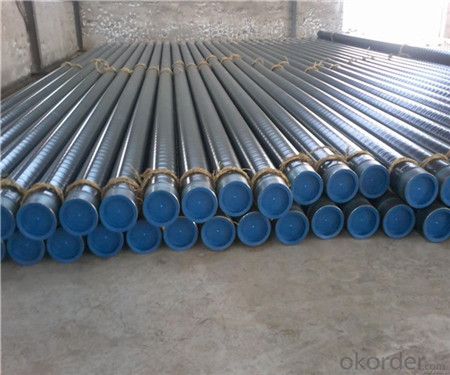
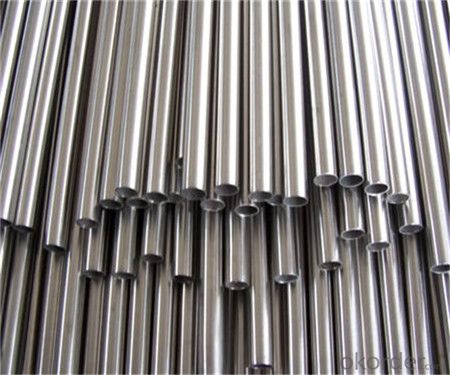
- Q: What are the safety precautions while working with steel pipes?
- When working with steel pipes, it is important to follow several safety precautions. Firstly, always wear protective gear such as gloves, safety glasses, and steel-toed boots to prevent injuries. Secondly, ensure that the work area is properly ventilated to avoid inhaling harmful fumes or gases. Additionally, use caution when handling heavy pipes to prevent strains or sprains. Lastly, be mindful of potential hazards such as sharp edges, hot surfaces, or falling objects, and take appropriate measures to minimize risks.
- Q: Can steel pipes be used for heating and cooling systems?
- Yes, steel pipes can be used for heating and cooling systems. They are commonly used in HVAC systems due to their durability, high temperature resistance, and ability to handle high pressure. Steel pipes are suitable for both hot water and steam distribution for heating, as well as chilled water distribution for cooling systems.
- Q: Can steel pipes be used for hydropower generation?
- Yes, steel pipes can be used for hydropower generation. Steel pipes are often used in the construction of hydroelectric power plants to transport water from a higher elevation to lower areas, where the water's kinetic energy is converted into mechanical energy to generate electricity. The durability and strength of steel pipes make them suitable for this purpose, as they can withstand the high pressure and flow rates of water in hydropower systems.
- Q: Can steel pipes be used for chemical processing plants?
- Yes, steel pipes can be used for chemical processing plants. Steel pipes are commonly used in chemical processing plants due to their strength, durability, and resistance to corrosion, making them suitable for transporting various chemicals and fluids safely and efficiently. Additionally, steel pipes can withstand high temperatures and pressures, which are often encountered in chemical processing operations.
- Q: What are the main types of steel pipe ah? How to judge which kind of steel pipe performance is better?
- Sort by connectionThe connection way of steel pipe can be divided into: light pipe (pipe end without thread) and wire tube (Guan Duan with thread).The tube can be divided into ordinary tube and end tube.Thickening of the tube can also be divided into: extra thick (with external thread), internal thickening (with internal thread) and inside and outside thickening (with internal and external thread) and other vehicle wire tube.The wire tube can also be divided into ordinary cylinder or taper thread and special thread.In addition, according to user needs, wire tubes are generally equipped with pipe delivery.Plating characteristicsAccording to the characteristics of surface coated steel pipe can be divided into: Clarinet (not coated) and coating tube.The coating tubes include galvanized pipes, aluminium plated tubes, chrome plated pipes, aluminized tubes and other alloy layers.The coating tube has an outer coating tube, an inner coating tube and an inner and outer coating pipe. The commonly used coatings are plastics, epoxy resins, coal tar, epoxy resins, and various glass based anticorrosive coatings. Galvanized pipe is divided into KBG pipe, JDG pipe, threaded pipe, etc.
- Q: How are steel pipes insulated against heat loss?
- Steel pipes can be insulated against heat loss using several methods. One common method is through the use of insulation materials such as mineral wool or fiberglass wraps. These materials are wrapped around the pipes to create a barrier that reduces heat transfer. Another method is the application of insulation coatings, such as foam or rubber coatings, directly onto the surface of the pipes. These coatings create a protective layer that minimizes heat loss. Additionally, thermal tape or heat-resistant tape can be used to seal any gaps or joints in the insulation, ensuring a continuous barrier against heat loss. Overall, insulating steel pipes against heat loss is essential to maintain the temperature of the fluid or gas being transported and to increase energy efficiency in various industries.
- Q: What are the main components of a steel pipe?
- The main components of a steel pipe include the steel material itself, which is typically made from carbon and alloy steel, as well as various coatings or linings that can be applied to enhance its durability and resistance to corrosion. Additionally, a steel pipe may also have fittings such as flanges or couplings, and may be further reinforced with supports or braces depending on its intended use.
- Q: Are metal spiral tubes the same as metal bellows?
- The spiral pipe is mainly used in the pipeline of petroleum and natural gas, and its specifications are indicated by outer diameter * wall thickness.
- Q: What are the different types of steel pipe coatings for chemical processing plants?
- There are several types of steel pipe coatings commonly used in chemical processing plants, including epoxy, polyethylene, polyurethane, and fusion-bonded epoxy (FBE) coatings. Each coating offers different benefits such as corrosion resistance, chemical resistance, and enhanced durability, which are crucial for protecting steel pipes against the harsh conditions and corrosive substances found in chemical processing plants.
- Q: How are steel pipes used in the manufacturing of desalination plants?
- Steel pipes are used in the manufacturing of desalination plants for various purposes such as transporting seawater, brine, and treated water within the plant. They provide durability, corrosion resistance, and the necessary strength to withstand high-pressure conditions, ensuring the efficient operation and long-term reliability of the desalination process.
Send your message to us
Seamless Hot Rolled Steel Pipe > 114.3
- Loading Port:
- China Main Port
- Payment Terms:
- TT or LC
- Min Order Qty:
- 100 m.t.
- Supply Capability:
- -
OKorder Service Pledge
OKorder Financial Service
Similar products
Hot products
Hot Searches
Related keywords
